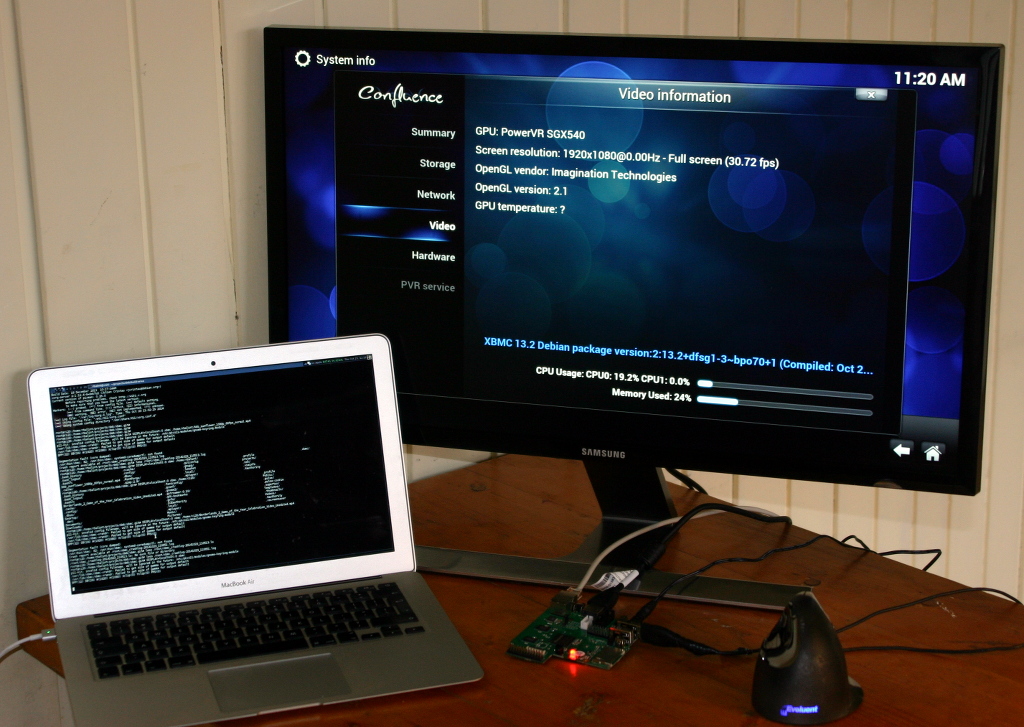 This brief announcement was released yesterday to the debian-devel-announce mailing list.
This brief announcement was released yesterday to the debian-devel-announce mailing list.
Ciao!
The Debian Multimedia Maintainers have been quite active since the Wheezy release, and have some interesting news to share for the Jessie release. Here we give you a brief update on what work has been done and work that is still ongoing.
Let s see what s cooking for Jessie then.
Frameworks and libraries
Support for many new media formats and codecs.
The codec library libavcodec, which is used by popular media playback applications including vlc, mpv, totem (using gstreamer1.0-libav), xine, and many more, has been updated to the latest upstream release version 11 provided by
Libav. This provides Debian users with HEVC playback, a native Opus decoder, Matroska 3D support, Apple ProRes, and much more. Please see
libav s changelog for a full list of functionality additions and updates.
libebur128
libebur128 is a free implementation of the European Broadcasting Union Loudness Recommendation (EBU R128), which is essentially an alternative to ReplayGain. The library can be used to analyze audio perceived loudness and subsequentially normalize the volume during playback.
libltc
libltc provides functionalities to encode and decode Linear (or Longitudinal) Timecode (LTC) from/to SMPTE data timecode.
libva
libva and the driver for Intel GPUs has been updated to the 1.4.0 release. Support for new GPUs has been added. libva now also supports Wayland.
Pure Data
A number of new additional libraries (externals) will appear in Jessie, including (among others) Eric Lyon s fftease and lyonpotpourrie, Thomas Musil s iemlib, the pdstring library for string manipulation and pd-lua that allows to write Pd-objects in the popular lua scripting language.
JACK and LADI
LASH Audio Session Handler was abandoned upstream a long time ago in favor of the new session management system, called ladish (LADI Session Handler). ladish allows users to run many JACK applications at once and save/restore their configuration with few mouse clicks.
The current status of the integration between the session handler and JACK may be summarized as follows:
- ladish provides the backend;
- laditools contains a number of useful graphical tools to tune the session management system s whole configuration (including JACK);
- gladish provides a easy-to-use graphical interface for the session handler.
Note that ladish uses the D-Bus interface to the jack daemon, therefore only Jessie s jackd2 provides support for and also cooperates fine with it.
Plugins: LV2 and LADSPA
Debian Jessie will bring the newest 1.10.0 version of the
LV2 technology. Most changes affect the packaging of new plugins and extensions, a brief list of
packaging guidelines is now available.
A number of new plugins and development tools too have been made available during the Jessie development cycle:
LV2 Toolkit
LVTK provides libraries that wrap the LV2 C API and extensions into easy to use C++ classes. The original work for this was mostly done by Lars Luthman in lv2-c++-tools.
Vee One Suite
The whole suite by Rui Nuno Capela is now available in Jessie, and consists of three components:
- drumkv1: old-school drum-kit sampler synthesizer
- samplv1: polyphonic sampler
- synthv1: analog-style 4-oscillator substractive synthesizer
All three are provided in both forms of LV2 plugins and stand-alone JACK client. JACK session, JACK MIDI, and ALSA MIDI are supported too.
x42-plugins and zam-plugins
LV2 bundles containing many audio plugins for high quality processing.
Fomp
Fomp is an LV2 port of the MCP, VCO, FIL, and WAH plugins by Fons Adriaensen.
Some other components have been upgraded to more recent upstream versions:
- ab2gate: 1.1.7
- calf: 0.0.19+git20140915+5de5da28
- eq10q: 2.0~beta5.1
- NASPRO: 0.5.1
We ve packaged ste-plugins, Fons Adriaensen s new stereo LADSPA plugins bundle.
A major upgrade of
frei0r, namely the standard collection for the minimalistic plugin API for video effects, will be available in Jessie.
New multimedia applications
Advene
Advene (Annotate Digital Video, Exchange on the NEt) is a flexible video
annotation application.
Ardour3
The new generation of the popular digital audio workstation will make its very first appearance in Debian Jessie.
Cantata
Qt4 front-end for the MPD daemon.
Csound
Csound for jessie will feature the new major series 6, with the improved IDE CsoundQT. This new csound supports improved array data type handling, multi-core rendering and debugging features.
din
DIN Is Noise is a musical instrument and audio synthesizer that supports JACK audio output, MIDI, OSC, and IRC bot as input sources. It could be extended and customized with Tcl scripts too.
dvd-slideshow
dvd-slideshow consists of a suite of command line tools which come in handy to make slideshows from collections of pictures. Documentation is provided and available in /usr/share/doc/dvd-slideshow/ .
dvdwizard
DVDwizard can fully automate the creation of DVD-Video filesystem. It supports graphical menus, chapters, multiple titlesets and multi-language streams. It supports both PAL and NTSC video modes too.
flowblade
Flowblade is a video editor like the popular KDenlive based on the MLT engine, but more lightweight and with some difference in editing concepts.
forked-daapd
Forked-daapd switched to a new, active upstream again dropping Grand Central Dispatch in favor of libevent. The switch fixed several bugs and made forked-daapd available on all release architectures instead of shipping only on amd64 and i386. Now nothing prevents you from setting up a music streaming (DAAP/DACP) server on your favorite home server no matter if it is based on mips, arm or x86!
harvid
HTTP Ardour Video Daemon decodes still images from movie files and serves them via HTTP. It provides frame-accurate decoding and is main use-case is to act as backend and second level cache for rendering the
videotimeline in Ardour.
Groove Basin
Groove Basin is a music player server with a web-based user interface inspired by Amarok 1.4. It runs on a server optionally connected to speakers. Guests can control the music player by connecting with a laptop, tablet, or smart phone. Further, users can stream their music libraries remotely.
It comes with a fast, responsive web interface that supports keyboard shortcuts and drag drop. It also provides the ability to upload songs, download songs, and import songs by URL, including YouTube URLs. Groove Basin supports Dynamic Mode which automatically queues random songs, favoring songs that have not been queued recently.
It automatically performs ReplayGain scanning on every song using the EBU R128 loudness standard, and automatically switches between track and album mode. Groove Basin supports the MPD protocol, which means it is compatible with MPD clients. There is also a more powerful Groove Basin protocol which you can use if the MPD protocol does not meet your needs.
HandBrake
HandBrake, a versatile video transcoder, is now available for Jessie. It could convert video from nearly any format to a wide range of commonly supported codecs.
jack-midi-clock
New jackd midiclock utility made by Robin Gareus.
laborejo
Laborejo, Esperanto for Workshop , is used to craft music through notation. It is a LilyPond GUI frontend, a MIDI creator and a tool collection to inspire and help music composers.
mpv
mpv is a movie player based on MPlayer and mplayer2. It supports a wide variety of video file formats, audio and video codecs, and subtitle types. The project focuses mainly on modern systems and encourages developer activity. As such, large portions of outdated code originating from MPlayer have been removed, and many
new features and improvements have been added. Note that, although there are still some similarities to its predecessors, mpv should be considered a completely different program (e.g. lacking compatibility with both mplayer and mplayer2 in terms of command-line arguments and configuration).
smtube
SMTube is a stand-alone graphical video browser and player, which makes YouTube s videos browsing, playing, and download such a piece of cake.
It has so many features that, we are sure, will make YouTube lovers very, very happy.
sonic-visualiser
Sonic Visualiser Application for viewing and analysing the contents of music audio files.
SoundScapeRenderer
SoundScapeRenderer (aka SSR) is a (rather) easy to use render engine for spatial audio, that provides a number of different rendering algorithms, ranging from binaural (headphone) playback via wave field synthesis to higher-order ambisonics.
Videotrans
videotrans is a set of scripts that allow its user to reformat existing movies into the VOB format that is used on DVDs.
XBMC
XBMC has been partially rebranded as
XBMC from Debian to make it clear that it is changed to conform to Debian s Policy. The latest stable release, 13.2 Gotham will be part of Jessie making Debian a good choice for HTPC-s.
zita-bls1
Binaural stereo signals converter made by Fons Adriaensen
zita-mu1
Stereo monitoring organiser for jackd made by Fons Adriaensen
zita-njbridge
Jack clients to transmit multichannel audio over a local IP network made by Fons Adriaensen
radium-compressor
Radium Compressor is the system compressor of the Radium suite. It is provided in the form of stand-alone JACK application.
Multimedia Tasks
With Jessie we are shipping a set of
multimedia related tasks.
They include package lists for doing several multimedia related tasks. If you are interested in defining new tasks, or tweaking the current, existing ones, we are very much interested in hearing from you.
Upgraded applications and libraries
- Aeolus: 0.9.0
- Aliki: 0.3.0
- Ams: 2.1.1
- amsynth: 1.4.2
- Audacious: 3.5.2
- Audacity: 2.0.5
- Audio File Library: 0.3.6
- Blender: 2.72b
- Bristol: 0.60.11f
- C* Audio Plugin Suite: 0.9.23
- Cecilia: 5.0.9
- cmus: 2.5.0
- DeVeDe: 3.23.0-13-gbfd73f3
- DRC: 3.2.1
- EasyTag: 2.2.2
- ebumeter: 0.2.0
- faustworks: 0.5
- ffDiaporama: 1.5
- ffms: 2.20
- gmusicbrowser: 1.1.13
- Hydrogen: 0.9.6.1
- IDJC: 0.8.14
- jack-tools: 20131226
- LiVES: 2.2.6
- mhWaveEdit: 1.4.23
- Mixxx: 1.11.0
- mp3fs: 0.91
- MusE: 2.1.2
- Petri-Foo: 0.1.87
- PHASEX: 0.14.97
- QjackCtl: 0.3.12
- Qtractor: 0.6.3
- rtaudio: 4.1.1
- Rosegarden: 14.02
- rtmidi: 2.1.0
- SoundTouch: 1.8.0
- stk: 4.4.4
- streamtuner2: 2.1.3
- SuperCollider: 3.6.6
- Synfig Studio: 0.64.1
- TerminatorX: 3.90
- tsdecrypt: 10.0
- Vamp Plugins SDK: 2.5
- VLC: Jessie will release with the 2.2.x series of VLC
- XCFA: 4.3.8
- xwax: 1.5
- xjadeo: 0.8.0
- x264: 0.142.2431+gita5831aa
- zynaddsubfx: 2.4.3
What s not going to be in Jessie
With the aim to improve the overall quality of the multimedia software available in Debian, we have dropped a number of packages which were abandoned upstream:
- beast
- flumotion
- jack-rack
- jokosher
- lv2fil (suggested replacement for users is eq10q or calf eq)
- phat
- plotmm
- specimen (suggested replacement for users is petri-foo fork of specimen)
- zynjacku (suggested replacement for users is jalv)
We ve also dropped mplayer, presently nobody seems interested in maintaining it.
The suggested replacements for users are mplayer2 or mpv. Whilst the former is mostly compatible with mplayer in terms of command-line arguments and configuration (and adds a few new features too), the latter adds a lot of new features and improvements, and it is actively maintained upstream.
Please note that although the mencoder package is no longer available anymore, avconv and mpv do provide encoding functionality. For more information see avconv s
manual page and
documentation, and
mpv s encoding documentation.
Broken functionalities
rtkit under systemd is broken at the moment.
Activity statistics
More information about team s activity
are available.
Where to reach us
The Debian Multimedia Maintainers can be reached at pkg-multimedia-maintainers AT lists.alioth.debian.org for packaging related topics, or at debian-multimedia AT lists.debian.org for user and more general discussion.
We would like to invite everyone interested in multimedia to join us there. Some of the team members are also in the #debian-multimedia channel on OFTC.
Cheers!
Alessio Treglia
on behalf of the Debian Multimedia Maintainers
 Debian Jessie has been released on April 25th, 2015. This has opened the
Stretch development cycle. Reactions to the idea of making Debian
build reproducibly have
been pretty enthusiastic. As the pace is now likely to be even faster,
let's see if we can keep everyone up-to-date on the developments.
Before the release of Jessie
The story goes back a long
way
but a formal announcement to the
project
has only been sent in February 2015.
Since then, too much work has happened to make a complete report, but
to give some highlights:
Debian Jessie has been released on April 25th, 2015. This has opened the
Stretch development cycle. Reactions to the idea of making Debian
build reproducibly have
been pretty enthusiastic. As the pace is now likely to be even faster,
let's see if we can keep everyone up-to-date on the developments.
Before the release of Jessie
The story goes back a long
way
but a formal announcement to the
project
has only been sent in February 2015.
Since then, too much work has happened to make a complete report, but
to give some highlights:
 Erlang lets you write applications supporting zero downtime by switching one live system to another running a different application version converting the application s state on the fly to the new representation. Debian packages however can have only one installed version on a system which prevents using Erlang s hot-upgrade feature easily.
Erlang lets you write applications supporting zero downtime by switching one live system to another running a different application version converting the application s state on the fly to the new representation. Debian packages however can have only one installed version on a system which prevents using Erlang s hot-upgrade feature easily.


 This brief announcement was released yesterday to the
This brief announcement was released yesterday to the  When we setup
When we setup 




 since people keep talking to me about my RC bug fixing activities, I thought
it might be time again for a short report. to be honest, I mostly stopped my
almost daily work at some point in december, partly because the overall
number of RC bugs affecting both
since people keep talking to me about my RC bug fixing activities, I thought
it might be time again for a short report. to be honest, I mostly stopped my
almost daily work at some point in december, partly because the overall
number of RC bugs affecting both 

